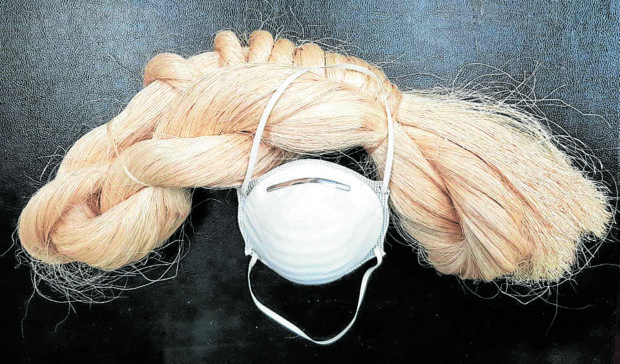Demand rises for PH abaca as raw material for PPE
MANILA, Philippines — Unknown to many, a raw material sourced from a type of banana plant, Musa textilis, is now in high demand due to the global shortage of one of the most important tools against the coronavirus pandemic — personal protective equipment (PPE).
Locally known as abaca, it has been one of the country’s top traditional cash crops for decades, along with sugar and tobacco, and appears to be making a comeback as the world rushes to produce more PPE.
“Before COVID-19, face masks, gowns, shoe covers, head covers and PPE only represented less than 1 percent of the total annual abaca production in the Philippines,” said Kennedy Costales, executive director of the Philippine Fiber Industry Development Authority (Philfida).
According to the official, abaca’s unique, porous fibers are ideal for making medical fabric. As such, the crop has rapidly become a prized commodity as governments all over the world try to stop the spread of COVID-19 without a vaccine, armed only with masks and PPE to save lives.
“With the new normal, demand for face masks will spike exponentially worldwide. PPE are just one of the hundred end products of the precious abaca plant,” Costales added.
Filipinos have been growing the plant for its fine, soft and sturdy fiber even before the arrival of the Spanish colonizers, who would later export cloth made from abaca, which they called “medriñaque.” During the American period, US businessmen found “Manila hemp” so useful that they started production in Panama, Costa Rica, Honduras and Guatemala.
Article continues after this advertisementToday, the fiber is used not only for clothing but also for food packaging and even currency notes (the Japan yen banknotes contain up to 30-percent abaca). And more than ever, its medical-grade quality has made it a sought-after material.
Article continues after this advertisementSupply deficit
“All countries who have abaca pulp and paper mills like England, Spain, France, Germany, China, Japan and USA have increased their abaca importation. In fact, we have a [supply] deficit right now of about 125,000 metric tons, which is equivalent to [the output from] about 60,000 hectares [of farmland],” Costales said.
At present, the Philippines only has 142,000 ha of land dedicated to growing hemp, with an average fiber yield per hectare of 0.54 MT. Of the country’s 81 provinces, 51 have abaca farms.
Almost one-third of the abaca-producing areas are in Bicol, with 52,493 ha planted to the crop—about the same size of the plantations in Central Visayas, Davao, Cotabato and Caraga regions combined.
Catanduanes in Bicol, where abaca can still be found growing in the wild, is the biggest abaca-producing province contributing 35 percent of the country’s total production, followed by Davao Oriental, which accounts for 8.5 percent.
The Philippines remains the world’s leading abaca producer with about 90,000 farmers involved in its cultivation.
Philfida data shows that the abaca sector contributes P4.7 billion to the economy annually and supplies 85 percent of the world’s abaca requirement.
‘Orders coming nonstop’
These numbers may already look impressive, but the sector’s full potential remains untapped as local farming methods remain rudimentary. Compared to the mechanized plantations in Ecuador, the world’s second largest producer, Philippine farms still lack support structures, like scientific or research facilities needed to deal with pathogens, specifically the abaca bunchy top virus and abaca bract mosaic virus.
Still, the past few weeks have given Leonora Mila, an abaca farmer from Agusan del Sur, a reason to be “more hopeful.’’
“During the past two years, sales have dwindled compared to the levels in 2015,’’ she said. “But orders are now coming nonstop. As long as we have supply, [buyers] are willing to purchase.”
Mila is part of San Isidro Upland Farmers Multi-Purpose Cooperative, which has more than 300 members and supplies the world’s biggest abaca trader, Ching Bee Trading Corp., a Filipino company that has been exporting natural fibers since the 1940s.
Her cooperative, she said, is willing to increase production if given enough capital and more government support.
Agriculture Secretary William Dar said the immediate challenge was how to develop cash crops like abaca under the “new landscape agriculture” wherein means of production must become more resilient to crises, such as the current coronavirus pandemic.
“There are technologies that can scale up the utilization of abaca. We should be able, in the future, [to] create an environment where local farmers and manufacturers would benefit,” Dar said.
Before the quarantine prompted by the health crisis, Dar said a big company expressed interest in investing in the local abaca industry by developing a plantation and manufacturing facility in the Caraga region. The discussions, however, were stalled by the pandemic.
Philfida believes that the government has a bigger part to play in the agency’s “dream to bring local abaca farmers into processing so they can share with the wealth that comes with abaca,” Costales said.
“By early 2021, with the establishment of nurseries, massive distribution of abaca seeds would be given for free to interested farmers who wish to engage in abaca farming. That is the start,” he added.
For more news about the novel coronavirus click here.
What you need to know about Coronavirus.
For more information on COVID-19, call the DOH Hotline: (02) 86517800 local 1149/1150.
The Inquirer Foundation supports our healthcare frontliners and is still accepting cash donations to be deposited at Banco de Oro (BDO) current account #007960018860 or donate through PayMaya using this link.
